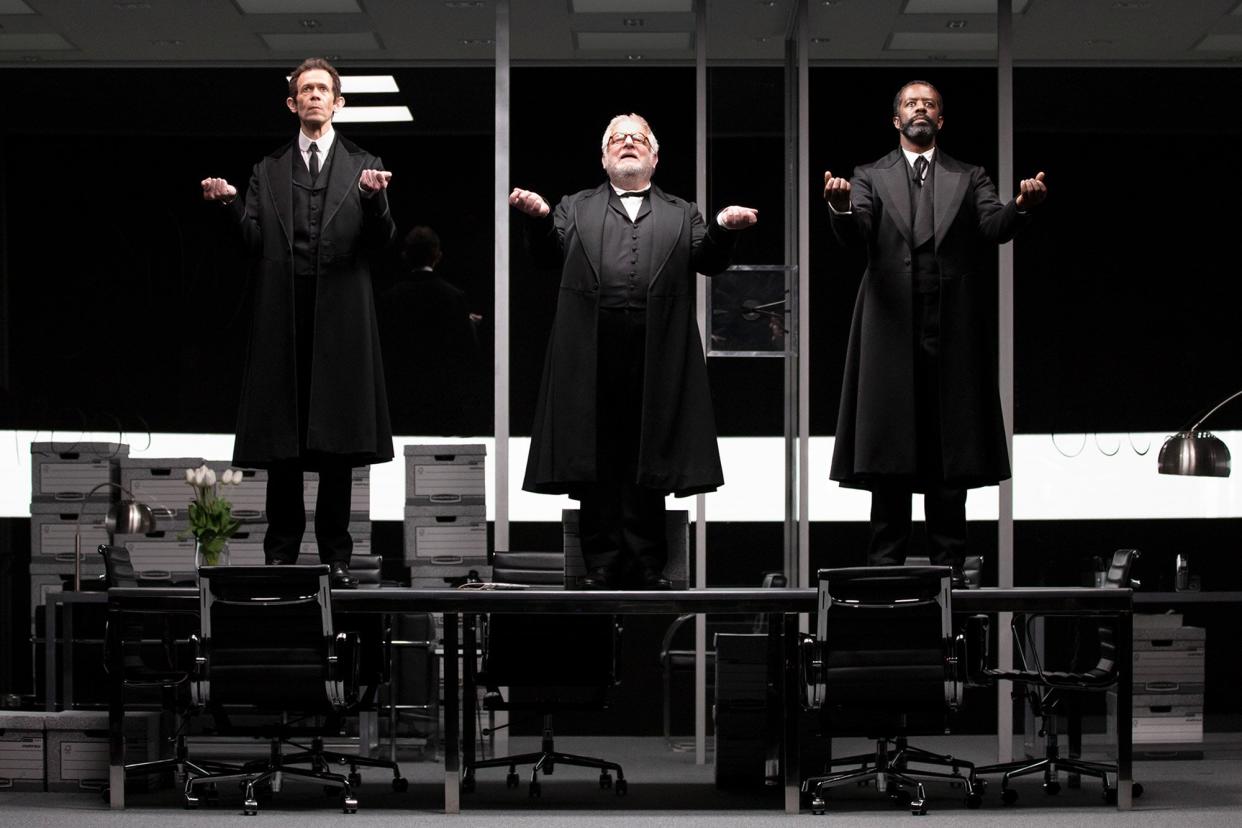The Lehman Trilogy review: Financial drama becomes a post-modern thrill on Broadway

- Oops!Something went wrong.Please try again later.
Julieta Cervantes
Looking out from the burnt husk of 2021, the 2008 financial crisis seems almost quaint. Did we ever have so much faith in institutions and the infallibility of men in C-suite suits? One day Lehman Brothers was there, one of world's largest, sturdiest investment banks; the next it was gone, liquidated under a cloud of bankruptcy and recrimination.
The Lehman Trilogy is about that, but not really: Stefano Massini's electric drama, which opens on Broadway tonight at the Nederlander Theater, is both an immigrant tale and an intimate history, a sprawling family saga and a comic tragedy. (Or is it tragic comedy?) It's also a quintessentially American story, though Massini wrote the original script in Italian and his words have been translated here for the stage by one Brit, Ben Power, and directed by another, Oscar winner Sam Mendes.
The three actors in it, too, are all English, and each one a powerhouse: Simon Russell Beale (Candide, Jumpers, Uncle Vanya) plays the paterfamilias and original Lehman, Henry — "the son of a cattle merchant, a circumcised Jew" — who arrives from his native Germany in 1844, one of hopeful millions in search of life and liberty. Landing first in New York then Montgomery, Ala., he's soon joined by younger brothers Emanuel (former Hustle star Adrian Lester) and Mayer (The Great's Adam Godley), though they're equally known by the nicknames accorded to their place and relative value in the sibling order: Henry is the head, Emanuel the arm, and 19-year-old Mayer, the potato. (He's as smooth-cheeked as a tuber, and about as listened to).
They're quickly conscripted into Henry's startup business selling fabric and clothing to the working poor of Montgomery, though none of it turns much of a profit until the potato — he's got ideas, that little spud — comes up with an expansion plan that involves moving raw cotton between the plantations and the factories, essentially inventing the concept of the middle man. Business leads the brothers to Manhattan, and the industrial boom there; soon they're not just brokers, they're a whole bank. And as the company grows, so does the family tree: new generations of Lehmans sprouting like so many saplings in the fertile ground of American capitalism.
All of those roles, and dozens beyond them — from drawling plantation owners to demure housemaids, toddlers to tightrope walkers — are played by the core trio onstage, each one continuously conducting their own kind of speed-round master class in characterization. (The biggest laughs often come, not surprisingly, from the incongruity of watching grown men transform through sheer will and skill into coquettish women or small children.) Scenic designer Es Devlin — who has conceived large-scale stage sculptures for operas and the Olympics, as well as pop stars like Billie Eilish, Beyoncé, and the Weeknd — contains all of it in an ingeniously designed glass office-space cube that spins on a lazy-Susan axle, with film projections behind it to indicate shifts in place and time: a cityscape, a cotton field, a world on fire.
Mendes, whose resumé stretches from American Beauty to two Bond films (he also won a Tony Award in 2019 for The Ferryman), has already brought lauded runs of Lehman to the Park Avenue Armory and London's West End, adapting it from its original five-hour runtime. The current version clocks in at a still-healthy three hours and 15 minutes with two intermissions — and though it would be a stretch perhaps to say that that time flies, it does sing. The writing, with its poetic loops and repetitions and fourth-wall winks, is so ratatat clever and well-constructed that it feels both mechanically fit and virtuosic, and the acting is so consistently, exhaustively excellent that you want to give a medal and a cold compress to them all.
As deeply flawed as its many characters can be — ornery and petty and blind to their own faults — the story rarely deigns to judge them. Instead, it lets them simply exist in the context of the dreams they're chasing and the crashing convergence of events that marked the century and a half their narratives move through: Civil Wars, stock-market crashes, all the ordinary loves and losses that make up a life. "Money is a ghost. Money is numbers. Money is air," one character declares ruefully, somewhere late in the third act. Whatever billions were lost on paper — and how ever many essential truths about the Lehmans have been lost to history — this Trilogy finds the thrill in letting them live again on stage: the heart, the hand, and the potato, spinning myth (and cotton) into gold. Grade: A–
Related content:

